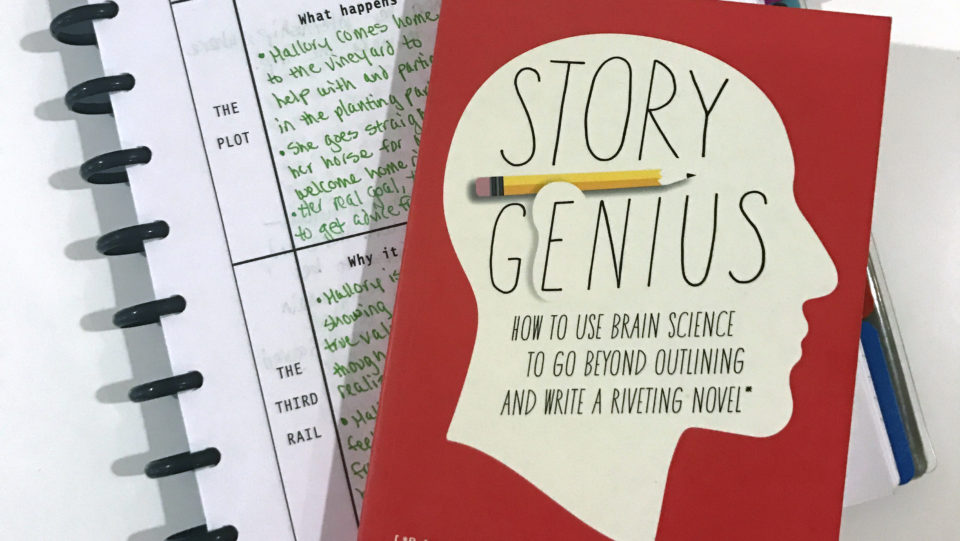If you’re a part of the writing community, no doubt you’ve heard about Story Genius by Lisa Cron. Probably multiple times. You may have even been beaten over the head with it. For me, it has come up in conversation at least several times a week in every writing community I’m a part of since its release!
(Maybe it’s me beating you over the head with it. It’s pretty much become my answer to all life’s problems. Ha!)
If you haven’t heard of it, Story Genius is the latest in long list of craft books we writers try to keep up on to stay sharp with our craft, and constantly find new ways to be better, more productive writers. It made quite a ripple through the writer-verse, combating notions we have long held tightly to amongst our kind–notions like plotting versus pantsing, and plot-driven versus character-driven stories. These topics have always resulted in heated debates and with Cron’s strongly-stated arguments, it’s no wonder the book has put people firmly only one side of the fence or the other about using her techniques.
Today, I want to tell you why I’m firmly on the “pro” side.
How I Usually Write Stories
The book released at the perfect time for me. I had finally finished the last of my edits on Perfectly Undone and I was ready to start digging into Book 2. I had about 40,000 very rough words written, as I had taken the same approach I usually do in writing a book. It goes something like this:
- Come up with a brilliant idea.
- Let it simmer for 5-10 years.
- Come up with the major plot points that will encourage my character to grow based on the theme of her journey.
- Learn as much about my characters as possible though random questions I more or less pull out of my you know what.
- Start writing so I can discover more about my characters. They often reveal themselves to me through their actions.
- Get a very messy, disjointed first draft.
- Throw the entire thing out.
- Write a slightly more focused second draft. Really start to see my story coming through.
- Shred that draft based on what I discover.
- Continue shredding draft after draft, often with many teary phone calls to my agent, wondering if I even know what I’m doing, and so on, and so forth.
And as I started on Book 2 (which, by the way, is not the second book I’ve ever written–it will be the 4th completed book, with several other failed attempts left in the wake), I was committed to going through this process again. It was quite painful, but it was my process, and I didn’t know any better way to do it.
At first glance, I didn’t know if it would be any different than the other craft books I’d tirelessly read and tried to apply to my novel, which would sometimes end up in marginal improvement of my manuscript, but more often than not, would contradict other craft “rules” I’d learned and leave me more confused than anything. Still, with all the buzz, I was excited to read it, hopeful that this one would, indeed, be different. After getting many notes from my agent and editor on my synopsis, in which they questioned the actions of my main character and the way my subplots wove together, the only response I had was an embarrassing and resounding, “I have no freaking clue.” Because I hadn’t written half a dozen drafts yet, which is how I usually discover the answers to these questions.
Here’s the thing, though: I don’t have time to do a dozen major rewrites on this book, like I’ve done before. This time, I’m under contract. I have a deadline. And this was terrifying to me.
So as I prepared for National Novel Writing Month and diving back into my draft, with these many, many questions circling through my head, I pulled Story Genius close, hanging on to Lisa Cron’s every word, and here is what I discovered…
How Story Genius Is Different
1. You are encouraged to neither plot nor pants.
This worked intuitively for me because I was always somewhere in the middle anyway. I would plot out the major stuff, focusing on my character’s arc, and then let the story guide me from one point to the next. For those who are big plotters, though, the exercises in this book will save you so much time, not having to concretize every point of your story before you even get started. And for those who write by the seat of your pants, it’s going to save you so much time in revisions because your first draft will already be mostly cohesive without having to do all that mind-numbing organizing ahead of time.
2. You get to know your character on a deeper level.
And this is where the story is at. The entire opening of Story Genius explains the how and why behind this, but think about what you love about books. When you think about your favorite stories, do you love them because of the actions the characters took, or because of the characters themselves. I explain this about The Walking Dead all the time because my friends and family wonder how I could be obsessed with something so gory and violent. The answer is because The Walking Dead isn’t about the gore and the violence, it’s about the characters and how they cope with the worst situation imaginable. You can’t help relating to who they are, where the come from, and the emotional struggles they have to overcome.
By the time you finish Story Genius, you know what makes your own character tick–the good, the bad, and the ugly. You know their deepest “why” in such a way that everything they do naturally blooms from that authentic place. And that is what will draw readers to your books. That deep understanding of other human beings is why we read in the first place.
3. It helps you get to the heart of what makes a scene.
Oh my gosh, scenes. Am I right? At the beginning of every new scene, I feel like I’m standing at the edge of the abyss and I know every decision I make is dire. Either I make the “right” choice and get across to the other side, or I make the “wrong” choice and fall into the deep, dark nothingness of a pointless scene. And there is nothing worse that being in the middle of a scene, looking around, and realizing I’m surrounded by inky blackness and there’s no way out. I have no choice but to toss the whole thing and start over.
No more of that, thank you very much! The Scene Card layout Cron provides ensures that not only is there always something happening in each scene, but that it is relevant to the core message of the book. There are suddenly no superfluous actions or scenes, no wandering, no lulls. Every scene is interwoven with the one before it and the one after, moving the story toward it’s destined conclusion in a completely natural way.
4. The exercises are actually relevant to your book.
I mean, seriously, who has time to do a bunch of different exercises that have nothing to do with our own stories? We’re trying to build writing careers here and that means writing words we can submit for publication. We don’t need more random ideas floating around in our thousands of notebooks.
That’s the thing about Story Genius, though. It’s much like having a writing coach sitting next to you, walking you through the book blueprinting process, asking you exactly the right question at the right time so you have a dozen little aha moments, your story blossoming right before your eyes. Every exercise has a clear point that helps you develop your character and your character’s journey, each one building on the last. Even the flashback scenes we are asked to write often end up in our drafts–they’ve already ended up in mine.
5. You will know you are creating a story readers will connect to.
Because the principles of Story Genius are based in brain science and Cron’s vast experience building stories, you will feel confident that the story you’ve always wanted to tell will translate to readers’ hearts. It’s because you will now focus on creating living, breathing characters. It’s because the Story Genius approach clicks on an intuitive level.
Why I Will Never Again Write Any Other Way
As you can see by my previous writing process, most of the wheel-spinning I did was in pursuit of character development. I always eventually got to the point that Story Genius leads us to–where we know our characters on a deep level, and they emerge from their journey changed–but I approached in such an inefficient way. Once I finished the exercises in Story Genius, though, I felt like my characters were people I had known most of my life. It is crystal clear to me the reason behind their every action, and because of this, I feel like I’ve saved myself 3 or 4 drafts.
Not only that, but for the first time in my writing life, I finally feel like I know what it takes to write a story. You all know I love to teach, but I’ve always shied away from teaching craft. It hasn’t been that I don’t know how to write a story, but I’ve never felt like I knew how I knew how to write a story. Story has always been something I’ve plodded in the direction of, following a series of intuitive notions, until eventually, I reached something that resembled a book. Story Genius, though, put all those “intuitive notions” into clearly defined steps that any writer can follow.
Every writer I know worries that one day they will forget how to write books and their careers will be over. I’ve felt that way too–that I will run out of ideas that I can develop into a book. (We all have ideas–it’s the ability to grow them into several hundred coherent pages that’s the real challenge.) With this book as my bible, I no longer have that fear. It gives me all the tools I need to feel capable.
Some people have asked me whether they should use this book during a revision, or only with a first draft.
As I said, for me, I was somewhere in the middle. What was already written of Book 2 was on the verge of being scrapped anyway because my agent and editor had pinpointed many things that weren’t working for the story (Using my previous chaotic tactics? No way!). So essentially, yes, I was starting on a first draft.
If you’ve already done a lot of polishing on your manuscript and aren’t prepared to make substantial changes, you may want to hold on to Story Genius until you start your next one. On the other hand, if that story isn’t getting the attention you wish it would, it’s probably worth another look. It might just be that your story is missing some keys elements, and NEEDS some deeper digging in order to come together and find a publishing home. It may be difficult to hear–heaven knows I’ve sobbed over many lost drafts–but think hard about whether you’re avoiding a revision because of the amount of work it will take or because you feel insanely confident in your story. Follow your gut, and know that if you do decide on a revision, with Story Genius, you will have everything you need to make the hard work worth it.
This book is a game changer. There’s no other way to say it. And all the buzz about it proves that I’m not the only one who thinks so.
Have you read Story Genius? If so, what did you think? How has it changed the way you write stories?




I am reading this book now. I have to tell you, this makes sense. Story should serve the mechanics of the craft, and you can’t know the story until you know your character deeply. I can’t wait to rework my manuscript now with this in mind.
Thank you for sharing this review. I purchased after reading your post. Now, I’m almost to the end of the book and plan to put it into practice to revise one of my manuscripts. I’m wondering are there steps you added, steps you skipped in your processing of the book’s exercises.
You’re so welcome! Glad to hear you enjoyed the book as much as I did!
I have to admit, I didn’t write the flashback scenes as I worked through the book, simply because my brain has a hard time doing exercises like that. I ended up just summarizing those scenes but that proved to be enough for me to keep moving forward.
The only thing I think I added (not sure if it’s really adding) was answering the misbelief and milestones questions for my supporting characters as well. I wanted them to be as fleshed out as my main character.
Otherwise, I felt like the book pretty much covered it all! I hope your revision goes well!
Thank you Jamie for the extra tip. I started strong in the new year and then got waylaid by life, but I’ll get back on track soon. Best wishes.
Thank you for telling us about this amazing book! I asked for it for Christmas and Santa delivered (well, my sis-in-law did anyway). I’m only on Chapter 6, but I can already see the value in this book. I’m a sworn pantser who has TRIED doing some planning. It never worked out. The one time it did, my book read like an outline that was filled in. It was awful.
Thank you so much for bringing this book to my attention!
Yay for Santa! Yes, I agree, it’s hard to find the right balance between plotting and pantsing and that’s why I think this book is so valuable. It’s the perfect combination of both.
You’re so welcome! I look forward to hearing how your book comes together!